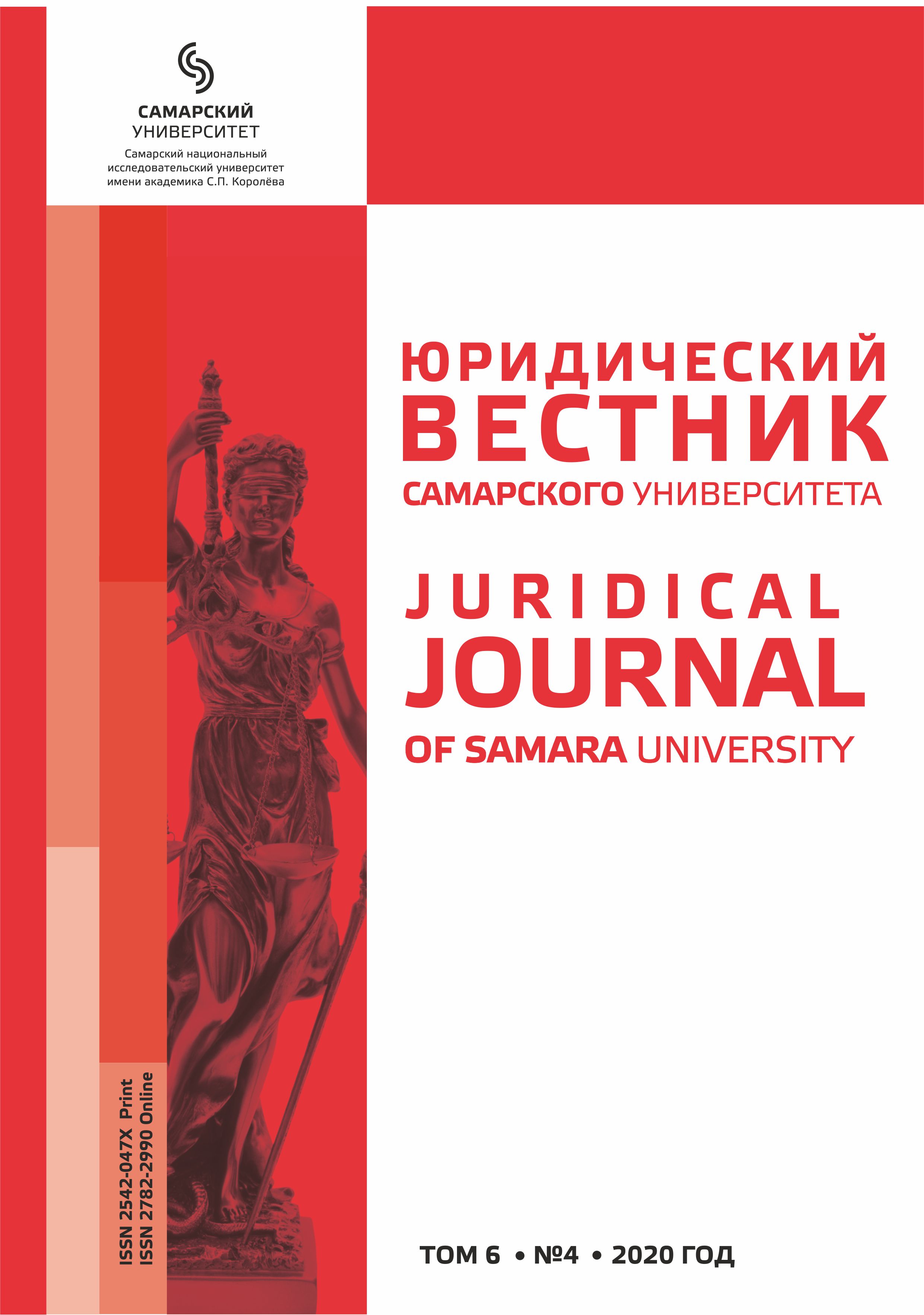KRITARCHY AS A SPECIAL FORM OF STATE (ON THE EXAMPLE OF SOMALIA)
- Authors: Makutchev А.V.1
-
Affiliations:
- Tula State Lev Tolstoy Pedagogical University
- Issue: Vol 6, No 4 (2020)
- Pages: 17-25
- Section: Theory of law and state
- URL: https://journals.ssau.ru/jjsu/article/view/8348
- DOI: https://doi.org/10.18287/2542-047X-2020-6-4-17-25
- ID: 8348
Cite item
Full Text
Abstract
The article analyzes the characteristic features of kritarchy – a specific structure of society based on the power of the courts. Experts consider kritarchy primarily as a social or legal system, and some consider it a political regime. The author of the article attempted to study kritarchy as a form of state, a set of political and legal components (methods of organization of higher authorities, territorial structure of power, ways of its implementation) that can replace the usual forms of state in traditional societies. Kritarchy is considered a historical form of social and state structure that is not found today. Nevertheless, Somalia from the late 1980-ies to the present day, according to the author, is a modern example of kritarchy. In a weak, «failed state», Somali society returned to a traditional way of life that created the basis for kritarchy. The author analyzes the courts as a substitute for the standard system of government, Somali law (a synthesis of customary and Islamic law) as an analog of standard legal systems, it demonstrates the viability of kritarchy as a form of state in the absence of traditions of usual forms of state in society.
About the authors
А. V. Makutchev
Tula State Lev Tolstoy Pedagogical University
Author for correspondence.
Email: mackutcheve@gmail.ru
Russian Federation
References
- Van Notten M. The Law of the Somalis: A Stable Foundation for Economic Development in the Horn of Africa. Trenton: Red Sea Press, 2005, 255 р.
- Hashim A. B. The Fallen State: Dissonance, Dictatorship, and Death in Somalia. Lanham: University Press of America, 1997, 151 р.
- Bol'shoi iuridicheskii slovar'. Pod red. A. Ia. Sukhareva, V. E. Krutskikh [Sukharev A.Yu., Krutskikh V. E. (Eds.) Large legal dictionary]. Moscow: INFRA-M, 2003, 703 p. Available at: http://law.niv.ru/doc/dictionary/biglegal/index.htm [in Russian].
- Olivier N. Fragile and Failed States: Critical Perspectives on Conceptual Hybrids. International Political Science Review, 2013, no. 33–1, pp. 326–341. DOI: http://doi.org/10.1177/0192512113480054.
- Coyne C. Reconstructing Weak and Failed States: Foreign Intervention and the Nirvana Fallacy. Foreign Policy Analysis, 2006, no. 2 (4), pp. 343–360. URL: https://ssrn.com/abstract=887414.
- Kreijen G. State Failure, Sovereignty and Effectiveness: Legal Lessons from the Decolonization of Sub-Saharan Africa. Hague: Martinus Nijhoff Publishers, 2004, 386 р. Available at: http://bookre.org/reader?fi le=792293.
- Tikhomirov Ju. A. Kurs sravnitel'nogo pravovedeniia [Comparative law course]. Moscow: NORMA, 1996, 432 p. Available at: http://publik-hse.narod.ru/Tikhomirov.doc [in Russian].
- Leeson P. T. Better off stateless: Somalia before and after government collapse. Journal of Comparative Economics, 2007, vol. 35, no. 4, pp. 689–710. Available at: https://ssrn.com/abstract=879798.
- Prendergast J. Crisis Response: Humanitarian Band-Aids in Sudan and Somalia. London: Pluto Press, 1997, 172 р.
- Samatar A. Merchant capital, International Livestock trade, and Pastoral Development in Somalia. Canadian Journal of African Studies, 1987, Vol. 21, no. 3, pp. 355–374.
- Mubarak J. The Hidden Hand Behind the Resilience of the Stateless Economy in Somalia. World Development, 1997, no. 25, pp. 2027–2041. DOI: http://doi.org/10.1016/S0305-750X(97)00104-6.
- Nenova Т., Harford T. Anarchy and Invention. Public Policy for the Private Sector, 2004, no. 280, pp. 1–4. Available at: http://hdl.handle.net/10986/9655.
- Little P. D. Somalia: Economy Without State. Blumington: International African Institute, 2003, 206 р.
- Menkhaus K. Somalia: State Collapse and the Threat of Terrorism. New York: Oxford University Press, 2004, 92 р.
- Lezhe R. Velikie pravovye sistemy sovremennosti: sravnitel'no-pravovoi podkhod: Per. s fr. A. V. Griadova [Great legal systems of our time: comparative legal approach: translated from French by A. V. Gryadov]. Moscow: Volters Kluver, 2009, 584 p. Available at: https://obuchalka.org/2017092996700/velikie-pravovie-sistemi-sovremennosti-sravnitelno-pravovoi-podhod-raimon-l-2010.html [in Russian].
- Fredriksson M., Arvanitakis J. Property, Place and Piracy. London: Routledge, 2017, 258 р. DOI: http://doi.org/10.4324/9781315180731.
- Barnes C. The Rise and Fall of Somalia's Islamic Courts. Chatham House, 2007. Available at: http://www.chathamhouse.org.uk/pdf/research/africa/bpsomalia0407.pdf.
- Santoro L. Islamic Clerics Combat Lawlessness in Somalia. The Christian Science Monitor, 2002. Available at: https://www.csmonitor.com/1999/0713/p1s2.html.
- Background Information on Other Terrorist Groups. United States Department of State, 2018. Available at: https://www.globalsecurity.org/security/library/report/2004/pgt_2003/pgt_2003_31759pf.htm.
- Casey G. Libertarian Anarchy: Against the State. London: Bloomsbury Publishing, 2012, 208 р. Available at: https://archive.org/details/podcast_austrian-scholars-conference-2_libertarian-anarchy-against-t_1000118032685; https://readli.net/libertarian-anarchy.
- Tobin B. Indigenous Peoples, Customary Law and Human Rights. London: Routledge, 2014. 304 р.
- Chirkin V. E. Sovremennye global'nye modeli osnovnykh prav cheloveka: novyi podkhod [Modern global models of fundamental human rights: a new approach]. Vestnik Universiteta imeni O. E. Kutafina [Courier of Kutafin Moscow State Law University (MSAL)], 2015, no. 5, pp. 127–134. Available at: https://www.elibrary.ru/item.asp?id=25062148 [in Russian].
- David R., Jauffret-Spinosi C. Osnovnye pravovye sistemy sovremennosti. Per. s fr. V. A. Tumanova [Basic legal systems of modernity. Translated from French by V. A. Tumanov]. Moscow: Mezhdunar. otnosheniia, 1996, 400 p. Available at: http://socio.isu.ru/ru/chairs/krs/sotrudniki/david_rene_osnovnye_pravovye_sistemy_sovremennosti.pdf [in Russian].
- Sravnitel'noe pravovedenie. Pod red. E. E. Ampleevoi, I. L. Chestnova [Ampleeva E. E., Chestnova I. L. (Eds.) Comparative law]. Saint Petersburg: Sankt-Peterburgskii iuridicheskii institut (filial) Akademii General'noi prokuratury Rossiiskoi Federatsii, 2017, 104 p. Available at: https://b-ok.global/book/3504448/15965d [in Russian].
Supplementary files










